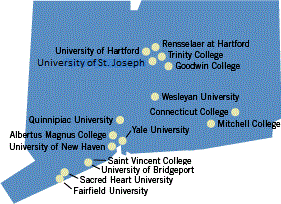Independent Colleges Produce Majority of Graduates for State's Key Industries
/
The 16 institutions of higher education in Connecticut that are members of the Connecticut Conference of Independent Colleges are playing a pivotal role in producing graduates with expertise in precisely the industry clusters that Connecticut businesses view as the fields most likely to propel economic growth in the state.
In one critical field, Computer & Information Sciences, three-quarters of the degrees granted in the state a re awarded by the independent institutions. And in seven key industry clusters – essential to building the state’s economic strength and job opportunities – the independent institutions award more than half of the degrees granted by colleges and universities in the state.
re awarded by the independent institutions. And in seven key industry clusters – essential to building the state’s economic strength and job opportunities – the independent institutions award more than half of the degrees granted by colleges and universities in the state.
By offering strong academic programs – and attracting top students – the independent colleges and universities are advancing a focus on industry areas with the greatest economic growth potential in Connecticut.
The percent of statewide industry cluster degrees awarded by Connecticut independent colleges in 2012:
- Computer & Information Sciences & Support Services, 75%
- Health Professions & Related Programs, 62%
- Physical Sciences, 59%
- Engineering Technology & Related Fields, 55%
- Engineering, 53%
- Biological& Biomedical Sciences, 53%
- Business Management, Marketing & Related Fields, 52%
The 16 member institutions of CCIC are Albertus Magnus College, Connecticut College, Fairfield University, Goodwin College, Mitchell College, Quinnipiac University, Rensselaer University, Sacred Heart University, St. Vincent’s College, Trinity College, University of Bridgeport, University of Hartford, University of New Haven, University of Saint Joseph, Wesleyan University, and Yale University.
Independent institutions award 46 percent of all degrees granted in Connecticut, and enroll 30 percent of all college students statewide, including 45 percent of all minority students enrolled at four-year institutions in the state, according to a study last year by the Institute for Research & Public Service.
The study also found that Connecticut’s private not-for-profit college and university sector, on the state economy in 2010, had a total impact of $6.19 billion in sales of goods and services. In the aggregate, the independent sector of higher education is Connecticut's third largest employer, with only the State itself and United Technologies employing larger workforces.



































